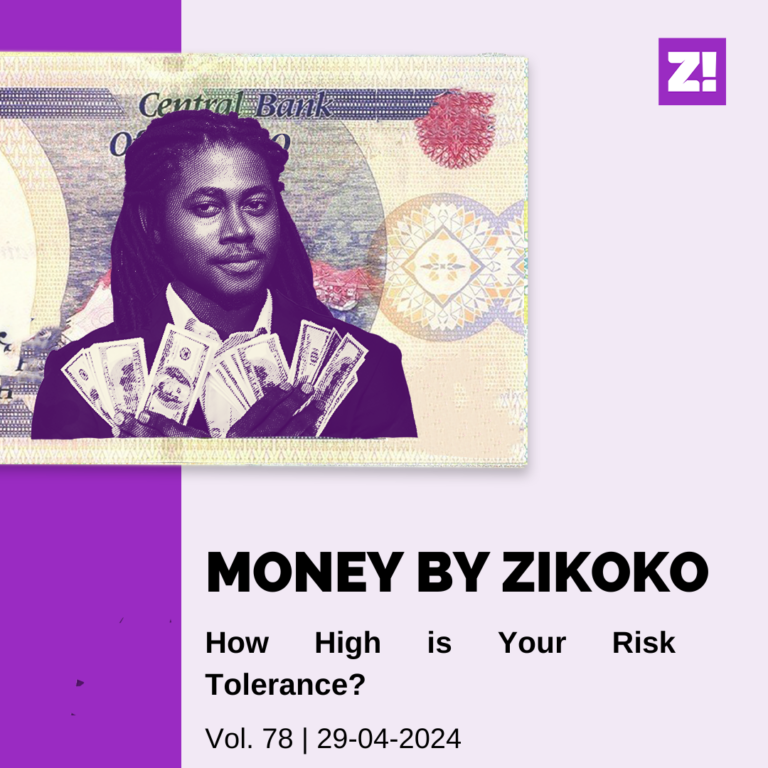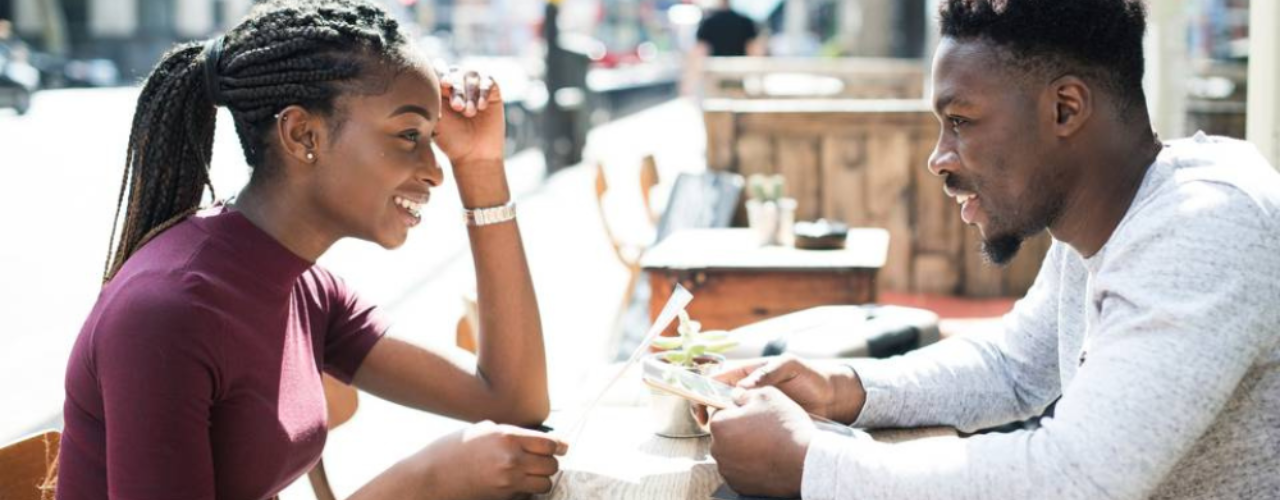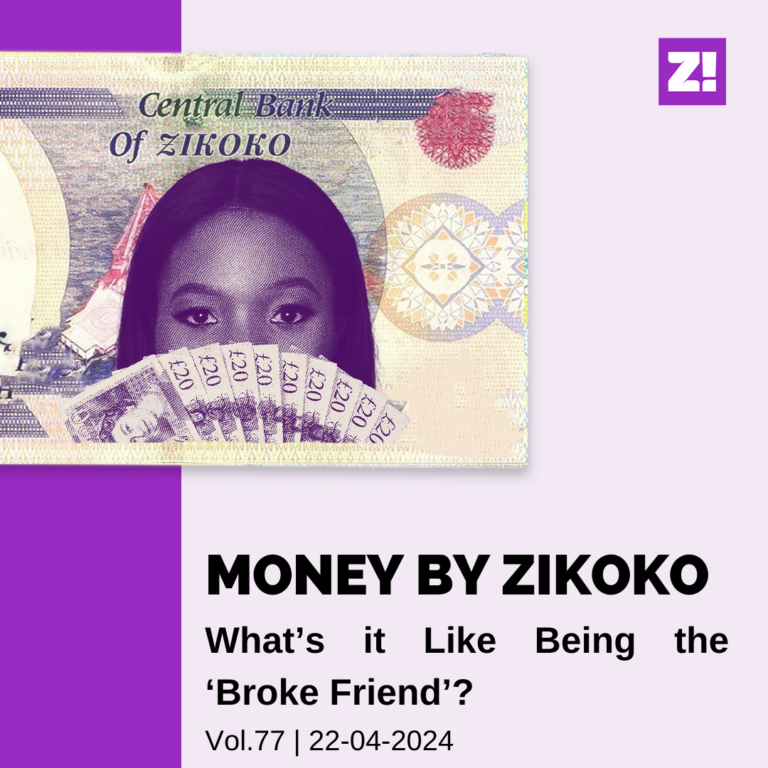Every week, Zikoko seeks to understand how people move the Naira in and out of their lives. Some stories will be struggle-ish, others will be bougie. All the time, it’ll be revealing.

When was the first time you understood what money meant?
As early as I could tell my right hand from my left. I come from almost nothing. Right from 2005 when I got into secondary school, I knew my family didn’t have money.
How?
My parents worked in the civil service; their salaries barely covered anything. However, they sent me to primary and secondary schools filled with kids whose parents were super comfortable. My parents could only afford the tuition because they had access to loans and other forms of credit from the cooperative societies they belonged to. They thought it’d shield me from our poverty, but you can’t hide things like that. Going to school every day was a reminder of how poor we were.
One time, in JSS 1, I went to a friend’s birthday party and the light tripped off while I was there. My friend casually said, “Up Daddy”, because her dad always changed their light to the inverter when NEPA did their usual.
This was in the mid-2000s. I didn’t know what an inverter was. Hell, we didn’t even have a small generator at home.
Bruh. What was it like switching between two worlds?
I always thought my friends didn’t deserve the money they had, but that was probably my inferiority complex. I also started thinking of making the best use of the situation. By SS 1, I’d realised that if you can provide value or service to people with money, you’d be their best friend.
What did you do?
My friends were in boarding school. My parents couldn’t afford the fees, so I was coming from home every day. Most of my friends wanted devices — Blackberry phones and PSPs were huge at the time — but phones were not allowed in school, so they couldn’t ask their parents.
I followed an uncle to the market to buy devices a few times and knew my way around, so I decided to help my friends get these things, hike the prices and pocket the margin.
The first time I did this, I made enough to buy my own phone.
Mad
I did other things for them. One time, I was cooking a plate of noodles and eggs at home and selling them to whoever showed interest. Another time, I was smuggling alcohol into school for them. Once they got bored of something, I’d think of something else to help them with.
All that ended when we left secondary school in 2012.
What was the next thing you did for money?
I didn’t start thinking of making money again until 2015. I was in my third year of uni when my dad retired from service. My mum became the only one earning money, and I had two younger sisters, so things went from bad to worse. I only got allowances whenever it was available, and the max I ever got at a time was ₦3k.
Everyone in school was jumping on the photography trend. So I became friends with student photographers, borrowed their cameras and found students willing to pay me money to photograph them. I earned an average of ₦3k to ₦5k per shoot once or twice a month.
Did you have any experience?
Nope. But I had access to cameras, free internet in school, and my mum had just bought me a laptop for my birthday — her cooperative financed it. I’d download tutorials and put whatever I learnt into use. I had everything I needed to wing it.
The occasional ₦3k – ₦5k meant I could afford meals and cab fares. Later in 2015, I got a social media management job at a restaurant in school that paid me three meals a week.
By my final year, nothing was coming from home anymore.
I had two DJ friends who helped me get a job as an in-house photographer at the club where they worked. The deal was to work two nights a week and earn ₦20k/month.
When I started handling the club’s social media page, my salary increased to ₦30k/month. The job got me through the rest of uni. I quit when I went for NYSC in June 2017.
Where did you serve?
In the South-South. An older cousin lived there, so accommodation was sorted. When I started thinking about how to make money, they also showed me where to look.
The locals loved adire clothes, so I found someone who made them in the South-West. They’d deliver batches to my mum who’d send them to me. I sold them mostly to people from my cousin’s office with a profit margin of between ₦2500 and ₦3k per piece. In a month, I sold up to ten pieces.
I’d started shooting corps member friends, making ₦10k – ₦15k, which I used as capital for the adire business.
What about your NYSC allowance?
I was a ghost corper. I struck a deal with the principal of the school I was posted to; they’d take my allowance every month and clear me, so I didn’t have to show up to work.
I was interning with a photographer in town. It wasn’t a paid job, and I had access to their cameras and studio for my own gigs. Before my service year ended in 2018, I almost made my first big money.
But you didn’t?
Hmm. My cousin told me about ethereum, and I put $100 into it. Within a month or two, $2500 was in my wallet. I kept putting my entire returns back into the investment. In my mind, I was saving money.
Then I woke up one morning to a market crash. That money was the only thing that gave me a sense of purpose; it was what I planned to use to open up a photography studio when I finished NYSC. I almost ran mad.
I’m sorry, man
I had to figure out what to do after my service year ended. The adire pieces weren’t selling as quickly anymore. I wasn’t making money from photography either because the corps members I knew had now left town.
And then I was robbed twice in one month, so I decided it was time to return to the South-West.
Did you have a plan?
Na-da. For a few months in 2019, I had nothing to do. I tried to get back to club jobs, but everyone who could fix me in one had moved away. The club I worked at before NYSC had changed management. My mum got me interviews for a few government and bank jobs, but I didn’t show up for the interviews — I didn’t think I was built for a 9-5 job.
I –
Before the year ended, I got a studio manager job with a photographer, and the pay was ₦30k. The job was another lesson about privilege. The guy I was working for couldn’t photograph for shit; his dad owned the space he converted into a studio, and he had the money to buy the gear. But I was the one running the place.
This wasn’t even my problem, but he wouldn’t pay my salary until the 15th of the following month. His excuse was we weren’t making enough money, but that was a lie. I ran every aspect of the business and knew about every single naira that came in. After my fifth month, we had a big fight that almost got physical. I left and never went back.
Wild
I left with most of the studio’s customers. But the gigs still weren’t consistent.
As if I wasn’t dealing with enough, I had a fight with my dad, and my mum advised me to leave the house to reduce the tension. But I had no money or savings.
One of my friends managed a boys quarter block in his grandmother’s house, and he had no problem renting a room out to me. We negotiated a 100k/year rent, split into two payment plans. I borrowed ₦50k from a friend and moved in with a box of clothes and a rug. I paid the balance and my debt four months later, from the money I made from photography gigs — about ₦30k/month.
It was almost like I was wasting away. I needed to leave that town. The next best place was where everyone looking for opportunities moved to.
Lagos?
Yup. In May 2020, I spoke with an uncle who agreed to let me live in his BQ with two other people. My uncle was nice enough to give me ₦500/day to hold myself together. But I needed to build a client base and find gigs.
I met another photographer in my uncle’s estate, by chance. Soon, we started collaborating to organise shoots to build our portfolios. Our relationship was mostly transactional: he had the money to pay for all the logistics, and I could teach him a thing or two about photography. Also, my uncle bought a professional camera for his business, but he let me use it for my own stuff too.
When did you start making money in Lagos?
Man, it took four months. At some point, I reached out to my sister who worked in financial services and told her I could use some referrals. She put the word out, and I got a job to shoot one of her colleagues. The pay was ₦50k. But she didn’t come back because she “had someone who could do the same thing at a cheaper rate.” Then she spread the word to other people in my sister’s place of work that I was too expensive.
I later met an actress through a photographer I worked with, and I started photographing her. She wasn’t paying me for the shoots, but her influence brought a couple of one-time gigs my way. These paid between ₦30k and ₦50k, and I invested most of my earnings in photography gear.
In 2021, I got a job as an in-house photographer for a fashion house for ₦70k/month. I only had to show up twice a week. In my first month, I took a bank loan of ₦400k to buy my first camera. For the next six months, ₦60k of my salary went into repayment.
So you were living on ₦10k per month?
Yes, and I used all of it on transportation. But one or two ₦30k side gigs usually got me through the month. After repaying the loan, I quit the job because I still wasn’t a fan of 9-5s and returned to the streets, hustling for gigs. I’ve been here since.
How have these gigs evolved over time?
I’ve been optimising for beauty and fashion photography jobs. Although they don’t come often, they pay the most — up to ₦300k per gig. But man, it’s difficult to find them.
I’ve shot about six weddings since 2021, and they paid between ₦300k – ₦400k. Sometimes, I assist other photographers and earn as much as ₦50k.
Birthday and portrait shoots are the most consistent, bringing in ₦30k – ₦50k per outfit change. In a good month, I could have ten clients. But the bad months could be as low as two or nothing at all.
It doesn’t even matter how much I make in a month, it always gets back to zero before the next month.
Why?
I’ve never been able to explain it. One minute, I’m boxed up. Then I spend money on the basic things I need, put some back into the business, and the money is gone.
I shot two weddings back-to-back in December 2022, and had ₦500k in savings at the end of the year. In January 2023, I did another job that brought my savings to ₦700k. But after paying ₦600k rent?
So far, my average income this year is about ₦250k. But I spend almost as much every month.
Can we attempt a breakdown?
Feeding – ₦90k
Transportation – ₦40k
Black tax – ₦50k
Internet – ₦30k
Girlfriend allowance – ₦50k
This is what a normal month looks like. But I haven’t had a normal month this year. Every cent I make has gone into something I’m sorting out.
What?
Some legal mess I was dragged into. I’d rather not talk about it because it’s still complicated.
How do you approach your income instability these days?
I’m tired, man. Sometimes, I feel stuck in this gig life. I keep making money that’s only enough for survival, which is a shame because I should be making more with my set of skills. But I’ve not been able to crack the code for better-paying gigs.
I’m not a big fan of 9-5, but it might be my escape route from my unstable income. At least, a fixed sum will come in every month, and I can plan my life around it. I’m currently job hunting for a full-time, in-house photography role with a studio or beauty brand.
How do you feel about this move?
I won’t even lie, I’m scared. I haven’t had any great experiences with 9-5 jobs so far. But I’ve tried everything I can, and nothing has worked.
What does your ideal 9-5 photography income look like?
Based on my years of experience and the quality of my portfolio, I’m hoping to get something in the region of ₦400k – ₦500k.
I hope you get it, man. I’m sure there’s something you want right now but can’t afford
In 2022, I got three admissions abroad that I couldn’t afford to take. And even though I’m currently in two ajo schemes, saving ₦50k each every month, I would only get ₦1m in total when it’s my turn to collect. It’s not enough to fund my education abroad.
On a scale of 1-10, how would you rate your financial happiness?
3. I barely get the things I want, and I struggle to get the things I need. A good month is one when I don’t starve to death. I’d really like to stop doing so much without seeing the impact on the quality of my life.
If you’re interested in talking about your Naira Life story, this is a good place to start.
Find all the past Naira Life stories here.





